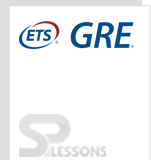 Introduction
Introduction
The chance to study in US universities or German universities is one in a lifetime opportunity for students. If you have missed the chance during your under-graduation, the GRE exam is the best opportunity to determine your potential that lays ahead. The ideal age for giving the GRE exam is under 23 where as much as 45% of the global test-takers lie. In the academic year 2017-18, as much as 61,500 students appeared for the GRE exam which constitutes more than 10 percent of the number of students who appeared for GRE worldwide. Though the number of students has shown a drop of about a staggering 19%, the competition in the domain of Social and Behavioural Sciences has shown an increase of about 8%. The domain of engineering has shown the steepest drop from about 26 thousand test-takers to nearly 18,300 test-takers, which is a sharp fall compared to the previous years. Surprisingly, the American Dream amongst the Indian test takers has not faded yet as more than 50Z% of the test-takers have the US as their preferred region for pursuing post-graduation. Second, comes the universities in Canada which shows a gradual increase in Indian test-taker preference. In 2013-14, 28% of Indian test-takers opted for Canada which has risen to 43% in 2017-18. It shows growth at the rate of 11.32% CAGR taking the number of periods as 4.
 GRE
GRE
GRE exam tests on the basis of three sections namely Verbal reasoning, Quantitative Aptitude and Analytical Writing. The statistical data regarding the scores of the same is shown in the table below:
| Subjects | Mean Score | SD score | Maximum Score |
|---|---|---|---|
| Verbal reasoning | 153.5 | 7.4 | 170 |
| Quantitative Aptitude | 152 | 7.806 | 170 |
| Analytical Writing | 3.94 | 0.7875 | 6 |
The score of the GRE exam is often a benchmark for landing into a reputed college in the GRE exam. In no way do you score in the GRE exam guarantee your selection into an Ivy League college. Yet, it is interesting to note about the score v/s college comparison of the GRE exam which makes it easy for the preparation.
Though the sectional scoring often becomes a very important part for selecting the students, colleges also pay important on the profile of the candidate. Therefore, it is also important to work on the profile along with preparing for the exam. Sectional scores above 165 for each section will give you the chance to appear for the best of the colleges available. A humble preparation can fetch you a score of around 150-154 which is good. A serious preparation is necessary to be in the top cream of the GRE score.
A comprehensive table explaining the score vs college comparison is done below:
| Name of the college | Verbal Ability | Quantitative Aptitude | Total Score |
|---|---|---|---|
| MIT, Stanford University, UTA- Austin, Havard University | 165-170 | 165-170 | 330-340 |
| Princeton University, Virgina Polytech, University of Pittsburg, Iowa State University | 160-165 | 160-165 | 325-330 |
| Michigan State University, Kansas State University, Boston University | 160-165 | 160-165 | 320-325 |
| University of Utah, University of Miami, UT – Dallas, University of Maine | 150-160 | 150-160 | 315-320 |
Note:
In order to get into the best colleges available, getting a ceiling breaking GRE score is essential. A good study plan is the only way to get an excellent score in the GRE exam. Let us discuss the study plan which you must follow to crack the gateway to your dream college.
 Study Plan
Study Plan
To start with the study plan of the GRE exam it is often essential to know the number of days you have in your hand along with the score you are targeting. If you are someone who is starting from scratch 90 days will be enough for you to crack the exam with a wonderful score. This study plan is for the beginners as well as the advanced students who have a certain level of preparation for the GRE exam.
Let us begin with the resources which you need to master the exam:
- The official Guide book for GRE exam by ETS; the Bible for GRE Exam
- Manhattan Prep GRE Strategy guide
- Barron’s GRE [latex]{21}^{st}[/latex] Edition
- Word Power Made Easy
- FlashCards by Magoosh
- Manhattan Test Series
- ETS test series
The first week of the preparation shall start with an overview of the important concepts for the GRE exam through the official GuideBook for GRE Exam by ETS or Barron’s GRE 21st Edition. It is not required to get into the depth of each topic in the initial stage of preparation.
It is not recommended to spend more than 2 days to go through the important topics. The quantitative aptitude revolves mostly around the higher secondary maths, thus it is the most scoring section in the GRE exam.
Now, it is time to take the first mock test for the GRE exam. Though it might not be going too well for the traditional test-takers, yet it is the best way to do your SWOT analysis. It is suggested to not look into the scores of the first mock test, rather spend the next three to four hours analyzing the strength areas and weak areas which you need to work upon.
Third day onwards, make it a ritual to use the following paraphernalia on a regular basis:
-
1. Word Power Made Easy
2. FlashCards by Magoosh
Tackling the quant section can be tricky as well as amusing. Since the section is a scoring section, it is recommended to not take any topic easily. For handling quant, divide the section into two parts. Mark one section as “Comfortable” and the other section as “To-be Comfortable”
In the next step, start with the comfortable sections and try to cover the comfortable sections within the next 3 weeks. Follow the schedule of not giving more than 3 days to the comfortable sections in Quant. On day one, go through the concepts related to quant from Barron’s GRE 21st Edition and make a habit of making a formula book for the same. On the second day, prepare a variety of new problems as well as practice the previously asked questions. On the third day, it is recommended to give a topic-wise test.
Once the three weeks are done, shift your focus on the “To-be Comfortable” subjects. In order to tackle these topics, increase the duration for studies by a couple of hours and try to complete the first revision of all such topics within no more than 5 weeks. Follow a similar 3-day strategy to complete the subjects.
Now with 4 more weeks left, it is time to buckle up your shoes and prepare for the last haul. In the last one month, start by giving one subject test every 3 days and utilize one complete day to analyze the test. Make a note of the questions which you are not able to solve and refer to your previous notes to know the type of the question. Secondly, revise all the formulas in the formula notebook and analyze how the formulas can be manipulated to ask tricky questions. Refer to the previous year's questions to get an insight into the same.
In the last week, it is time to relax and just focus on the exam which is yet to come. It is recommended that you don’t start any new topic now, rather focusing on a few of the tricky sums and quick tips might help you to gain a wonderful score.
Verbal Ability: The score setter
Right before you begin your preparation for the quant section, the preparation for the verbal section has begun with the use of Flash Cards and Word Power Made Easy. There is a good thing about verbal is that there is no such strict plan to prepare for the verbal section if your fundamentals of Grammar skills are very strong.
Start with analyzing the essays and make a practice to read essays 5 days a week and jot down the important points in the essays. On the sixth and seventh day, it is recommended to write at least two essays and get it analyzed by your instructor.
GRE doesn’t check about your vocabulary skills but checks about the analytics thinking process.
Starting from Week 1 through Week 4; focus on reading essays as much as possible using the “5+2 Day plan.” At the same time, it is recommended to keep yourself aware of the happenings of the world, hence subscribe yourself to monthly newsletters to keep yourself updated. Reading through quotes can be very helpful when it comes to AWA tests.
You can read certain books which would be very helpful to increase not only your vocabulary but also your writing skills. List of the top 5 books that you must read include:
- The Argumentative Indian (Amartya Sen)
- The Sparrow (Mary Doria Russell)
- How to be Alone (Jonathan Franzen)
- The Book Thief (Marcus Zusak)
- The Alchemist (Paulo Coelho)
- Sentence completion
- Sentence Equivalence
- Reading comprehension
- Multiple Answer Multiple Choice Questions
- Select-in Passage
 Student’s Corner
Student’s Corner
In this section of Student’s Corner, we give you tips to maximize your score by focussing on your preparation:
- Don’t prepare for more than 8 hours a day at maximum. Make sure to enjoy as much as you work.
- Prepare notes along with the studies which you can refer to. Notes have to crisp and brief.
- Keep a check on your health and eat fresh else your entire year’s preparation will not be fruitful.
- Mock tests should be given in pseudo-exam environments.
- Focus more on the writing section as it can be the tie-breaker for you






